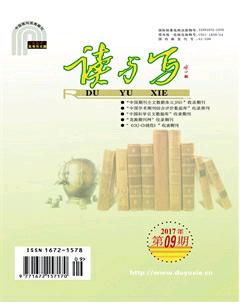Problems in Chinese EFL Learners’ English Writing and Countermeasures
GAO++Wei
Abstract:The present study classifies the problems in Chinese EFL learners writing into three major types, and proposes suggestions for promoting the writing skill from the perspectives of improving vocabulary and grammar knowledge, promoting critical thinking ability, and mastering rhetorical and cohesive devices.
Key words:problems; Chinese EFL learners; writing
中圖分类号:H315.9 文献标识码:A 文章编号:1672-1578(2017)09-0002-02
1 Introduction
In todays world, English has become the most widely used language. It is the official language or one of the official languages in about sixty sovereign states, and the third most common native language in the world after Mandarin Chinese and Spanish. Also, it is the most popular second language and the official language of the United Nations and the European Union, as well as other world and regional international organizations.[1]In the globalized age, English has become a world language which act as a media in the economical, political, cultural, scientific, and technological areas, etc. At present, nearly 80 percent of the digital data in the world is recorded in English, and over 65 percent of the scientists and researchers prefer to read articles in English. Therefore, English proficiency has become a key criterion for a persons talent in the age of globalization when the world is getting more and more integrated.
However, in the use of English, a large number of Chinese EFL learners are poor at English writing which is exactly the skill in need for their study, research, and career development and so on. For example, researchers need to write articles in English for publication, but a common practice is to write in Chinese first and have them translated in English later. College students usually consider writing as one of the most difficult tasks in English study, and in College English Examinations, they generally have lower scores in writing compared to other skills. Therefore, the promotion of learners writing ability should be given full priority in English teaching and learning.
2 Problems in Chinese EFL Learners English Writing
Chinese EFL learners problems in English writing could be classified into the following three types.
The first problem is that the learners practically do not know how to write an English essay, which is due to very poor mastery of the English language. Shortage of vocabulary, grammatical knowledge and practice in writing will result to this problem.
The second problem is that the learners do not know what to write about in an essay. Although they know how to use words and grammar rules to make sentences and compositions, they still lack critical thinking skills or logical thinking abilities. In this case, the essays they write are often without clear-cut propositions and solid arguments, or even without coherent and fluent discourse structure.
The third problem lies in that some English learners do not know how to write an essay in a good way. There may be no grammar mistakes in their writings, but still, we cannot feel the beauty of language because of the dull and flat writing style. The reason why the learners find it difficult to write good English essays is that they lack knowledge of skills which could help improve the quality of writings.
3 Suggestions for Promoting Chinese EFL Learners Writing Skills
In the first place, learners have to enhance their knowledge of vocabulary and grammar, and brush up the basics of grammar rules and spellings before writing any composition. This is actually the starting point for language study, either for listening, reading, speaking or writing. However, most Chinese EFL learners make a lot of mistakes in grammar and spelling during writing, and confuse the use of Chinese punctuation marks and those in English.Improving the basic knowledge of the language, therefore, has to be the first step for improving ones writing ability.
In the second place,learners have to develop their critical thinking abilities.“Critical thinking is the intellectually disciplined process of actively and skillfully conceptualizing, applying,analyzing,synthesizing,and/or evaluating information
gathered from,or generated by,observation,experience,reflection,
reasoning, or communication, as a guide to belief and action.”[2]In Chinas college education, students are generally short of systematic training on critical thinking skills,since most of the courses are focusing on the explanation of contents and knowledge, rather than emphasizing the importance of students reasoning ability.
In this case, we should solve the problem from the perspectives of both teachers and students. Language teachers should adapt their teaching objectives, contents and methods, in order to arouse students consciousnesses and abilities to think critically.For example, the teacher-dominating classroom could be transformed to a classroom of group-work or pair-work for discussion, debating or problem-solving. Content-oriented class activities could be substituted by thinking-oriented activities. From the perspective of language learners, they should improve their critical thinking in daily life consciously.
Last but not least, teachers and learners should pay more attention to the use of devices which could help facilitate the quality of writing, such as rhetorical devices and cohesive devices. It is not sufficient to write with correct spelling and grammar. Writing with a style of oneself is of more importance. Cohesive devices, such as transitional words and expressions for the functions of addition, contrast, compare, sequencing, and illustration and so on, could contribute to the coherence and cohesion of the article. Rhetorical devices, such as metaphor, hyperbole, alliteration, parallelism, and personification and so on, could add to the style and vividness of the article.
4 Conclusion
In short, Chinese EFL learners are confronting many difficulties and challenges in improving their English writing ability. The present paper suggests that they should solve the problem by promoting basic knowledge of vocabulary and grammar, training their critical thinking ability and mastering the uses of rhetorical devices and cohesive devices.
References:
[1] Retrieved June 18[EB/OL]. from https://en.wikipedia.org/wiki/English_language,2017.
[2] Scriven,M. & Paul, R. Defining critical thinking: A draft statement for the National Council for Excellence in Critical Thinking[On-line][EB/OL]. Available HTTP: http://faculty.olympic.edu/cbarker/definingcriticalthinking.htm.1996.
作者簡介:高维,外国语言学及应用语言学专业博士,研究方向:第二语言习得。

